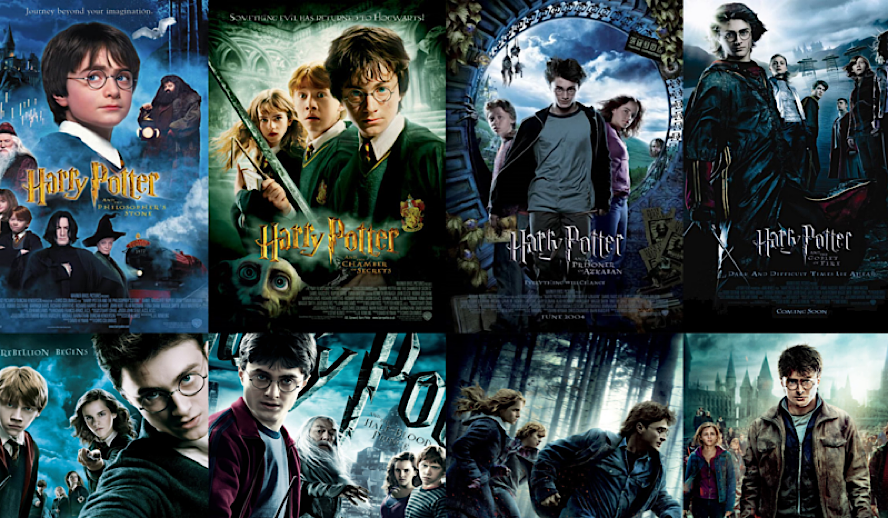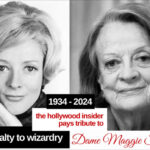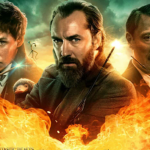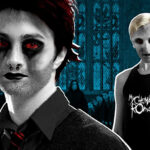Table of Contents

Photo: ‘Harry Potter’/Warner Bros.
They’re all pretty good, but which ones are great…? (Spoiler Alert)
Though they vary in quality (the first two being far inferior to the rest), the Harry Potter films are at least good enough to be the definitive adaptations of the books. The Potter series is a rare example of a franchise that gets broadly more interesting and more mature as it goes along. Regardless of quality, there is a joy to seeing the characters grow up from film to film, and to see the content and tone grow with them. The Potter films certainly came a long way from the safe, plodding first two Chris Columbus entries – but in which order….
#8 Harry Potter And The Philosopher’s Stone (2001), Chris Columbus.
The first Harry Potter film set up a solid framework for the rest of the franchise, especially visually. Diagon Alley, Privet Drive, and Hogwarts (most notably) are all immediately iconic sets. The film’s locations are brilliant, as is the now-classic score by Hollywood mega-composer John Williams. The Philosopher’s Stone is faithful to the book (perhaps too faithful) in terms of its inclusion of the many details of JK Rowling’s world. Most of this is superficial, but there are also some excellent, moving moments – the mirror scene where Harry (Daniel Radcliffe) sees his murdered parents feels like it belongs in a much better film.
Related article: ‘Harry Potter’ Stars LOUDLY Support Trans Lives Silencing J.K. Rowling
Related article: ‘Lord of the Rings’ Trilogy: 32 Facts on the Spell-Binding Fantasy Epic
The problem is that so much of this entry is rife with cheesy material. The Philosopher’s Stone is often annoyingly sunny in a way that I don’t remember the book being – it certainly doesn’t capture enough of the novel’s nuance or gothic sensibilities. Though the three leads turned out well, it is occasionally difficult to watch them carry a film that needed better acting to be interesting to wider audiences. It is also overlong for what is such a short book. The Philosopher’s Stone isn’t bad, but it isn’t particularly good either despite its wider importance to the franchise.
#7 Harry Potter And The Chamber Of Secrets (2002), Chris Columbus.
The Chamber Of Secrets shares almost all of its predecessors’ qualities. Chris Columbus is at the helm again, and he provides the same comfort food as he previously did. However, The Chamber Of Secrets is a more exciting story and therefore a slightly better film despite being almost exactly the same in every other way apart from the script. Chamber is cooler and more dangerous than the first (it has a creepy snake and lots of spiders!). It also further alludes to some of the series’ most interesting features, such as Harry’s connection to Voldemort through his ability to speak to snakes.
Subscribe to Hollywood Insider’s YouTube Channel, by clicking here.
As much as its familiarity comforts, Chamber Of Secrets also shares its predecessors’ defects. The cheese is still there. Columbus puts as much material as possible in but never seems to settle on what interests him most. As such, the film often feels laborious, and to be honest, boring. Chamber Of Secrets has a better story than the first one, which is what elevates it, but as an adaptation, the film still leaves a lot to be desired.
#6 Harry Potter And The Order Of The Phoenix (2007), David Yates.
Though probably the worst of the latter Potter films, The Order Of The Phoenix isn’t bad – it is certainly much better than the two aforementioned entries. It has a more grounded and consistent tone than its fantasy-heavy predecessor, The Goblet Of Fire. It, therefore, feels like a necessary progression – Harry himself seems different. We find him shortly after experiencing the murder of his friend, Cedric Diggory (Robert Pattinson), and his growing pain, anger, and sadness are conveyed well by the maturing Daniel Radcliffe. He still is the boy we love, but he is far more world-weary. The Ministry Of Magic plot is somewhat dry, but its inclusion is necessary for expanding the world. Order Of The Phoenix’s greatest strength is probably its’ villain, the horrifically evil Dolores Umbridge – the pen-torture scene is still genuinely creepy.
Related article: The Power of Positivity: Ikorodu Bois + Chris Hemsworth + Russo Brothers + Sam Hargrave
Limited Time Offer – FREE Subscription to Hollywood Insider
Order Of The Phoenix’s problems largely stems from the fact that the book is absolutely enormous yet it is one of the shortest films, which inevitably makes it feel choppy. Really interesting elements, such as Harry’s dream training, disappear from the plot as quickly as they emerge. Phoenix also suffers from middle-chapter syndrome – the ending is nowhere near as significant as the Goblet Of Fire’s and feels like a stopgap. Most irritatingly, Sirius Black’s (Gary Oldman) death has none of the weight it should have. He was given so much more significance in The Prisoner Of Azkaban (a far superior Potter entry) yet the treatment of his death in Phoenix fails to carry over the good work.
Order Of The Phoenix isn’t bad, but it does occupy the strange position of being stranded between the far inferior first two films and far superior upcoming entries on this list.
#5 Harry Potter And The Goblet Of Fire (2005), Mike Newell.
There is a reason why The Goblet Of Fire is a fan favourite that often features higher on Potter lists. It is tremendous fun, and is certainly the first in the series to feel truly epic – it is grandiose and overblown in a manner that mostly works in its favour. The perilous Triwizard Tournament at the heart of the story is a grabbing, immediate source of drama. After Prisoner Of Azkaban’s game-changing tonal shift towards a more prickly aesthetic, Goblet Of Fire continues this trend by featuring far darker content. It begins with a murder and ends with a far more significant killing – that of a child. In any other teenage-centric franchise this might not be that notable, but it is in the context of Harry Potter because such an event had been gradually built towards. Indeed, the murder of Cedric Diggory is a genuinely powerful, momentous event that immediately changes the world the characters live in. Goblet Of Fire’s main strength is this pivotal final act, which brilliantly shifts the tone from fantasy to light-horror.
Subscribe to Hollywood Insider’s YouTube Channel, by clicking here.
Unfortunately, though, Goblet Of Fire sometimes struggles to stay tonally consistent – it starts and ends like a children’s horror story but there is still distracting fluff in the middle. Granted, such levity is necessary – the kids are still fourteen after all. However, director Mike Newell often lets you forget about the danger by over-emphasising moments of fun (The Yule Ball) – this makes the overall film feel occasionally uneven. For these reasons, despite having some of the franchise’s best moments, The Goblet Of Fire ranks slightly lower than it would have done with more discipline.
#4 Harry Potter And The Deathly Hallows Part 1 (2010), David Yates.
The under-appreciated Deathly Hallows Part 1 is far better than its critics give it credit for. The stakes are very high – the various major deaths throughout create a genuine sense of tension and impending conflict. The entire film deals with death (both the threat of and reaction to) intelligently – the Deathly Hallows themselves provide an engaging, palatable way of discussing the great unknown. The lack of Hogwarts is a crucial factor in differentiating the film, particularly visually, from the other entries. Unlike Part 2, Deathly Hallows Part 1 feels much closer to the books in terms of adaptation. It does a lot with comparatively little content, which I find impressive.
Related article: What’s Going On with Roku and HBO Max?: A Brief Explainer on the So-Called “Streaming Wars”
Related article: Oscar Buzz | George Clooney Returns With ‘The Midnight Sky’, A Poignant Post-Apocalyptic Sci-Fi Drama
The problem with Part 1 is the inherent byproduct of its existence – it doesn’t have a conclusive ending. However, when judged against Part 2, I think that retrospectively people will realise that it was as good as it could have been. It is technically slow, but only at times, and it uses these breaks to build the characters in a way that is crucial to the success of the next entry.
#3 Harry Potter And The Deathly Hallows Part 2 (2011), David Yates.
The conclusive Deathly Hallows Part 2 is the most overtly exciting Harry Potter film – it is massively eventful and requires little to no setup. Part 2 is basically one long third act, which puts it in total opposition to its predecessor. It really is an explosive ending, both aesthetically and emotionally. The final battle is suitably momentous and there are many powerful scenes throughout. From the moment where Snape (Alan Rickman) dies to Harry’s sacrifice, the film delivers by far the series’ most powerful and engaging content. Crucial information is delivered so movingly that it retroactively makes older entries seem better given the new context. When it works, Part 2 is as spectacularly poignant as anyone could have hoped for.
Related article: Must-Watch – ‘Soul’: Pixar Proves the Power of the Human Spirit in Newest Original Film
Related article: 2020 Best Films – Less Tentpole Blockbusters and More Independent Smaller Budget Films
However as time has gone on, Part 2’s flaws have become more apparent. In many ways, it is an event film – some of the adrenaline it inspired came from the fact that Harry Potter was ending forever rather than its quality. There are certainly missteps, such as the various moments of quippy comedy uncharacteristic of the latter-Potter aesthetic and silly enough to appear in a Marvel film. Though the aforementioned middle passage is exceptional, after Harry’s revival the film dips in quality and ends far more routinely than I would want. Crucial details like Fred’s death and Harry’s speech are sped over or left out, which is slightly frustrating when you consider that, if such moments were included or better portrayed, the overall product could have been truly special. The final, CGI heavy ageing scene is also slightly distracting when viewed with a 2020 lens.
Still, for all these gripes it is worth saying that the good in The Deathly Hallows Part 2 stands out as the best in the entire series, even though the overall film is more uneven than you might remember.
Related article: Vox, Explained: The History & Evolution of their YouTube Channel Paving the Way for Internet Creators
#2 Harry Potter And The Half-Blood Prince (2009), David Yates.
In many ways, The Half-Blood Prince, the penultimate book, spawned the most mature Harry Potter film. Whereas its predecessor (Order Of The Phoenix) was heavy on plot and slight on character, Prince is the opposite – narratively focused and more intimate than you would expect. Half-Blood Prince is character-led in the best of ways – Harry and Dumbledore’s relationship is brilliantly portrayed and each scene where they interact is fantastically dramatic. The film’s best moments are during crucial discussions rather than large set-pieces. There are many poignant interactions and character developments, such as the moment where Horace recounts the way in which he experienced Lily Potter’s death. Where previous Harry Potter films hid weak drama through spectacle, The Half-Blood Prince confidently reverses the formula by subduing the spectacle and beefing up the drama. The film’s tragic, Empire Strikes Back-esque finale is genuinely impactful – it is both inherently sad and a signal towards the challenges to come. Prince’s grand-yet-subdued cinematography matches the atmospheric mood and reflects the fact that though increasingly dark, Hogwarts remains beautiful.
Some of the less successful moments come from comedy and romance. Still, where they would be annoying in other films, Yates fits the angst and dread of teen love with the threat of the impending conflict – both effectively signal the loss of childlike innocence.
The sixth Harry Potter film fleshes out its characters and lands the poignant final blow with aplomb. Easily the most underrated film in the franchise.
Related article: ‘God’s Own Country’ is a Must Watch for Fans of ‘Call Me By Your Name’
#1 Harry Potter And The Prisoner Of Azkaban (2004), Alfonso Cuarón.
Despite my praise for the series, I believe that Harry Potter And The Prisoner Of Azkaban is the only truly great Harry Potter film. It is the entry that most vividly captures the feeling of reading the books. It was crucial in allowing the franchise to veer away from the sugary, generically-Hollywood feel of the first two films. Azkaban shifts the tone to a more gothic atmosphere that is still fun and primarily child-centric. It offers the perfect balance between the darkness of the latter films and the original sense of whimsy. Cinematographically, it is the franchise’s best (followed closely by Half-Blood Prince). The level of practical detail, inventive camera movement, and memorable imagery are head and shoulders above the first two and much of what followed. In Azkaban, the wizarding world is at its most sensorily intriguing.
Despite arguably being based on the least dramatic book, Azkaban offers some of the franchises’ most moving moments. For the first time, Harry starts to feel like a real person, and you actually begin to feel for him. His loneliness is at the heart of his character’s struggle – his inability to relate to his friends’ experience and his need for a father figure in Lupin and Sirius is consistently poignant. Though lower in stakes, Azkaban’s finale is incredibly exciting – the book is potentially the sharpest in terms of narrative precision and its weird, time-travelling finale is executed with fitting efficiency by Alfonso Cuarón.
Azkaban’s only flaw is that in hard-hitting moments, Daniel Radcliffe’s acting maturity isn’t quite there yet to deliver the necessary emotional blows. This aside, The Prisoner Of Azkaban not only deserves to be considered the best of the Potter films but one of the best fantasy films of all time.
Click here to read Hollywood Insider’s CEO Pritan Ambroase’s love letter to Black Lives Matter, in which he tackles more than just police reform, press freedom and more – click here.
An excerpt from the love letter: Hollywood Insider’s CEO/editor-in-chief Pritan Ambroase affirms, “Hollywood Insider fully supports the much-needed Black Lives Matter movement. We are actively, physically and digitally a part of this global movement. We will continue reporting on this major issue of police brutality and legal murders of Black people to hold the system accountable. We will continue reporting on this major issue with kindness and respect to all Black people, as each and every one of them are seen and heard. Just a reminder, that the Black Lives Matter movement is about more than just police brutality and extends into banking, housing, education, medical, infrastructure, etc. We have the space and time for all your stories. We believe in peaceful/non-violent protests and I would like to request the rest of media to focus on 95% of the protests that are peaceful and working effectively with positive changes happening daily. Media has a responsibility to better the world and Hollywood Insider will continue to do so.”
Ways to support Black Lives Matter Movement to end systemic racism
More Interesting Stories From Hollywood Insider
– Want GUARANTEED SUCCESS? Remove these ten words from your vocabulary| Transform your life INSTANTLY
– Compilation: All James Bond 007 Opening Sequences From 1962 Sean Connery to Daniel Craig
– Do you know the hidden messages in ‘Call Me By Your Name’? Find out behind the scenes facts in the full commentary and In-depth analysis of the cinematic masterpiece
– A Tribute To The Academy Awards: All Best Actor/Actress Speeches From The Beginning Of Oscars 1929-2019 | From Rami Malek, Leonardo DiCaprio To Denzel Washington, Halle Berry & Beyond | From Olivia Colman, Meryl Streep To Bette Davis & Beyond
– In the 32nd Year Of His Career, Keanu Reeves’ Face Continues To Reign After Launching Movies Earning Over $4.3 Billion In Total – “John Wick”, “Toy Story 4”, “Matrix”, And Many More
Harry Potter, Harry Potter, Harry Potter, Harry Potter, Harry Potter, Harry Potter, Harry Potter, Harry Potter, Harry Potter, Harry Potter, Harry Potter, Harry Potter, Harry Potter, Harry Potter, Harry Potter, Harry Potter, Harry Potter, Harry Potter, Harry Potter, Harry Potter, Harry Potter

Amhara Chamberlayne is a graduate in English Literature from Warwick University who shares Hollywood Insider’s passion for cinema. When he is not watching films he is writing about them. Uninterested in gossip and agenda, Amhara instead believes in sharing his honest individual reaction to cinema. He enjoys the multi-variant reactions films elicit and believes his take is just as valid as others. For Amhara, the joy lies in the exchange of opinions.








